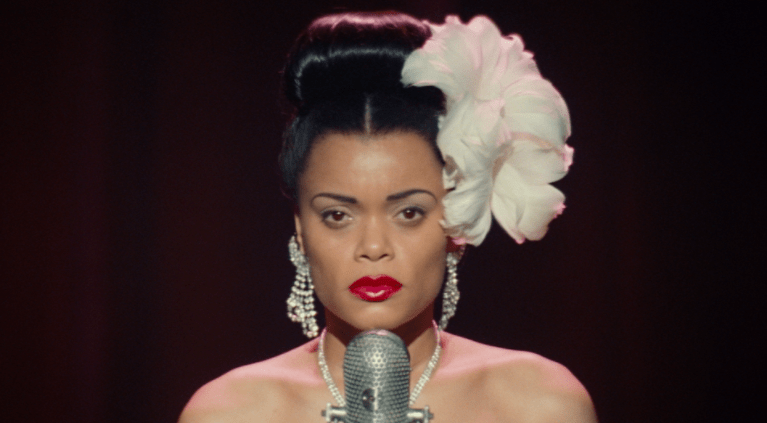By: Nicole Samoylovich
The recently released Hulu film, which earned Andra Day an Oscar nomination for Best Actress, focuses on the life of Billie Holiday, the legendary jazz musician who stirred controversy by singing her rendition of the iconic anti-lynching song “Strange Fruit” in nightclubs, and the subsequent witch hunt launched against her by the FBI for doing so.
Background
On February 21st, towards the end of Black History Month, The United States Vs. Billie Holiday was released on Hulu in the United States. This film tells the story of a massively famous and influential musician who was at the prime of her career throughout the 1940s and 50s, and more specifically, it tells the story of the last few years of her life, leading up to her early death at the age of 44 from liver cirrhosis. It is the story of Billie Holiday, and the circumstances surrounding her death, which is not nearly as famous as just her name is. The film The United States Vs. Billie Holiday largely revolves around the then-highly controversial song “Strange Fruit,” Holiday’s rendition of which eventually came to define not only her career but her personal life and her identity as a black woman in America at the height of Jim Crow-era lynchings. The namesake of the movie refers to the court case that resulted in a ‘guilty’ verdict against Holiday, thus sentencing her to one year in jail for narcotics possession. The central commentary of the film essentially says that the federal government had a motive to go after Holiday, not for her drug and alcohol abuse, but for her insistence to keep singing “Strange Fruit” at nightclubs, despite its disturbing and politically charged lyrics. This extends the commentary of the movie to include several more broad concepts, such as censorship, American racism, and the War on Drugs.
The Good
In short, there are many good things to say about this film. It contains stellar performances by Andra Day and Trevante Rhodes, and some very emotionally gutting plot points, such as the fantastical sequence when Holiday witnesses the aftermath of a lynching while on tour. The scene of the lynching follows Holiday as she stumbles throughout the rooms of a nearby house, utterly in shock and in clear, almost tangible pain from seeing something so gruesome and violent. After a visceral and heart-wrenching depiction of such pain, she stumbles into a room where her heroin supplier sits her down and begins tying a knot around her arm to give her a fix, but Rhodes’ character of Jimmy Fletcher, an FBI agent as well as Holiday’s lover, intervenes, preventing her from easing the pain with a high. The scene transitions from a shot of Holiday’s back, standing in the house, to a stage, where Holiday puts herself at risk by singing “Strange Fruit” to an audience at a nightclub, despite the persistent warnings of the Federal Bureau of Narcotics to not do so. Day depicts the complexity of Holiday exceptionally well in her singing scenes, and especially in this one, which remains a close-up of her face, allowing the viewer to stay focused on her features: her glistening, tired eyes and furrowed brows. It’s an incredibly impactful sequence emotionally, with all the pain and courage it depicts. There are many emotionally profound moments like these in the film, most of them dealing with Holiday’s drug abuse and personal experiences with racism, such as the scene where she is denied entry into an elevator at a segregated hotel, which she came to with a white actress friend (and implied romantic interest), Tallulah Bankhead, played by Natasha Lyonne. Day fantastically depicts the emotions of a woman with Holiday’s disposition and experiences, not only as a woman of color, but also as a rich, successful musician and drug addict navigating the threats and challenges thrown at her by the U.S. government, seemingly stopping at nothing to silence Holiday.
The Not-So-Good
However, many critics have pointed out the lack of attention the movie diverts to Holiday’s internal monologue, compared to the attention placed on all the tragic and unjust things that she is subject to throughout the movie. Many found the movie to be lacking a certain authenticity to Holiday’s character, instead just building the brunt of its storytelling around the supporting characters and the forces surrounding Holiday rather than Holiday herself. The movie at times seems to suddenly jump around from theme to theme with little segue in between; for a pretty significant chunk of the movie, Holiday is shooting up heroin backstage or having fleeting sexual encounters with various abusive men who contribute very little to her overall story; much of the movie doesn’t even stay with Holiday, but rather tells the story from the eyes of Jimmy Fletcher, who lies to Holiday and gains her trust while working for the FBI. The movie seems inconsistent in its core message - it’s unclear what it is trying to say, or what part of Billie Holiday it wants to depict: her drug abuse, her censorship, her history with abusive men, her fluid sexuality, her later illness. The movie contains all these things but the way it ties them together is mildly confusing and borderline dull, to say the least. It’s very difficult to draw any new insights about Holiday from viewing her on-screen relationships in this movie, meaning that the writing could have been more creative with regard to its characters. The writing makes each character seem under-developed, and most of all Holiday, who is reduced to a woman defined by her trauma, challenges, and downfall - basically, we see everything that happens to her, but very little of her in of herself.
Historical Accuracies
As for the historical accuracy of the film, it's safe to say that the majority of plot events were taken directly from real history, with some fictionalized aspects, such as the radio interview that took place throughout the film and the lynching Holiday fell witness to, which was actually based on the lynching that inspired Abel Meeropol to write “Strange Fruit” in 1937. Additionally, some aspects of the film can’t be confirmed or denied because very little is known about the real-life people that some characters are based off of, such as Fletcher. However, most of the details surrounding Holiday’s court case, romantic affairs, drug use, arrest, and even the clubs she performed at, are accurate. This means that Holiday did in fact die surrounded by police officers, chained to her bed, being denied vital medical care. If the movie is saying any one thing in particular about Holiday, it is saying that she was killed by the government for singing “Strange Fruit” - even though she wasn’t killed by the government directly, she was hunted by the Federal Bureau of Narcotics, and it broke her down physically and emotionally; they would never leave her alone, not until she was silenced.
Review
All in all, while the film portrays some outstanding moments of clarity and emotional impact with Andra Day’s acting and Andrew Dunn’s cinematography, the writing itself doesn’t seem to quite deliver Billie Holiday the justice that she deserves in terms of its storytelling. The movie could have done a better job establishing Holiday’s relationships and internal conflicts, instead of jumping around from event to event in her life without delving much into the complexity of these events and the impact they had on her. If these areas were a little better, the film would have been much more memorable than it is. Despite its shortcomings, however, the film is still very much worth the watch, if not for Day’s performance, then for the general knowledge it offers about the life of a remarkable activist figure from the early 20th century, whose life contains shocking details often unheard of, and the parallels it draws from America’s past to its present day, from the war on drugs, to activist censorship, to racism. As a lesson in African-American history, the film definitely provides a worthwhile service.
Article Citations:
- Boone, J. (2021, January 11). Andra Day Transforms Into Lady Day in “The United States vs. Billie Holiday” Trailer. Entertainment Tonight. https://www.etonline.com/the-united-states-vs-billie-holiday-trailer-andra-day-158841
- Collins, A. K. (2021, February 27). ‘The United States vs. Billie Holiday’ Fails to Take Into Account the Life of the Woman We Still Love. Rolling Stone. https://www.rollingstone.com/movies/movie-reviews/billie-holiday-lee-daniels-streaming-hulu-andra-day-1131313/
- Ebiri, B. (2021, February 27). The United States vs. Billie Holiday Is Surprisingly Inert and Forgettable. Vulture. https://www.vulture.com/article/united-states-vs-billie-holiday-movie-review.html
- Travis, B. (2021, February 26). The United States Vs. Billie Holiday. Empire. https://www.empireonline.com/movies/reviews/the-united-states-vs-billie-holiday/


